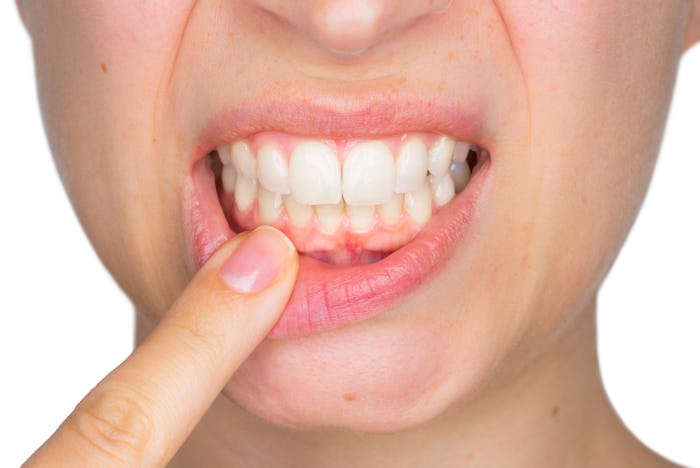No matter how unprepared you feel about being pregnant, you're probably aware of the aches and pains associated with pregnancy. You fully expect to have sore boobs, morning sickness, and back pain, but pain in your gums? That might be a symptom you weren't prepared for, and feeling soreness when you floss is the worst. So why do your gums hurt when you're pregnant? Is it a symptom of a bigger issue or is it all part of the lovely package that is pregnancy?
According to New York City dentist Edward Alvarez, DDS, it's not uncommon to have sore gums when you're pregnant. "Pregnancy brings about a huge change to how your mouth and gums handle inflammation," Alvarez says. "When you are pregnant, your estrogen and progesterone levels rise throughout your tissues and the way your body fights gum infection is decreased due to the rise of these pregnancy hormones, making you more likely to bleed."
He notes that this is referred to as pregnancy gingivitis and that actual receptors for estrogen and progesterone are found in your gum tissue, which increases your inflammatory response. "The increased absorption of the hormones causes increased vascularity (number of developing capillaries) and vascular (blood) flow in your gums," Alvarez says. "That is what gives them that dark red color and swollen look, and your gums will actually get bigger. In addition, the bacteria use the hormones and blood as a nourishment to grow in number and affect you even more."
Hormones, amirite? They're responsible for pretty much everything, whether it's good or bad throughout pregnancy. While swollen, sore gums are common, Alvarez notes that it's important to continue seeing your dentist. "Your body cannot effectively combat the bacteria, and starting in your second month to peaking in your eighth month, your gums will continue to swell and bleed," he says. "Left untreated, you can even develop a benign pregnancy tumor called a pregnancy epulis. You will usually see it somewhere between the front teeth, but it can occur anywhere." Alvarez notes that it can grow to the size of a pea and may have to be removed during pregnancy if it is repeatedly bleeding or if it becomes painful.
There's a huge misconception that you can't see a dentist when you're pregnant, but your gum health is incredibly important for not only you, but your baby. According to Alvarez, research has demonstrated that periodontal disease may have potentially harmful effects on the fetus, including premature birth and low birth weight. "The actual mediators of inflammation in periodontal disease can trigger pre-term birth," he says. "Studies have shown that mothers with periodontal disease were potentially seven times more likely to have a pre-term or low birth weight baby. A higher rate of late miscarriage has also been demonstrated in the research for mothers with poor periodontal health."
If your gums hurt, don't panic. It's common, but reach out to your dentist to avoid any other potential issues. Your dentist can work in conjunction with your OB-GYN to ensure that you, your baby, and your gums are all in good health.
